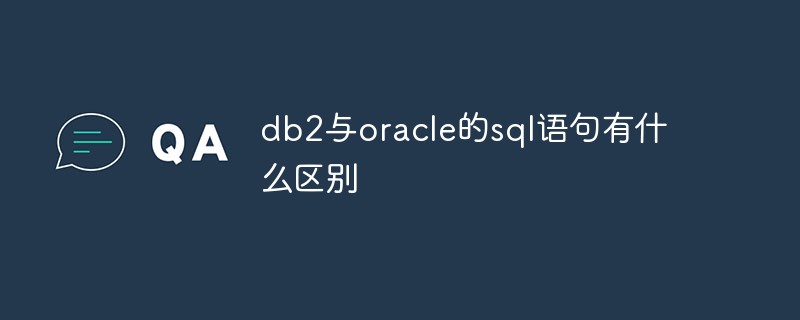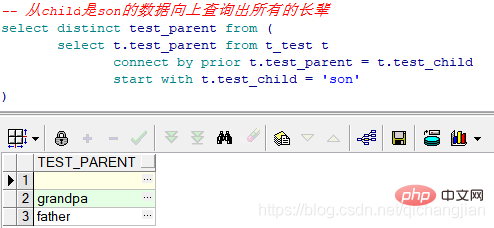What is the difference between db2 and oracle sql statements?
Difference: 1. db2 uses "create table a like b" to create a similar table, oracle uses "create table a as select * from b"; 2. db2 uses varchar type conversion, oracle uses the "to_char" function Convert.

The operating environment of this tutorial: Windows 10 system, Oracle 11g version, Dell G3 computer.
What is the difference between db2 and oracle sql statements
1. Create similar table syntax
Oracle : create table a as select * from b; DB2 : create table a like b; (8版本有效,9版本无效) create table new_a as select col1,col2... from a definition only
2. Quickly clear large table syntax
Oracle : truncate table a; DB2 : alter table a active not logged initially with empty table;
3. Get the first N data syntax
Oracle : select * from a where rownum <h4 id="strong-Get-the-system-time-syntax-strong"><strong>4. Get the system time syntax</strong></h4><pre class="brush:php;toolbar:false">Oracle : select sysdate from dual; DB2 : select current timestamp from sysibm.sysdummy1;
5. Different ways to convert null values
Oracle : select col1,col2,nvl(col3,'0') from tablename; (判断col3字段是否为空,不为空就输出原来的数值,为空就输出0) DB2 : select col1,col2,value(col3,'0') from tablename; (mysql和Db2可以使用Coalesce(col3,'0')函数来实现上述功能)
Coalesce() function
这个函数主要用来进行空值处理,其参数格式如下: COALESCE ( expression,value1,value2……,valuen) COALESCE()函数的第一个参数expression为待检测的表达式,而其后的参数个数不定。 COALESCE()函数将会返回包括expression在内的所有参数中的第一个非空表达式。 如果expression不为空值则返回expression; 否则判断value1是否是空值,如果value1不为空值则返回value1; 否则判断value2是否是空值,如果value2不为空值则返回value2; ……以此类推, 如果所有的表达式都为空值,则返回NULL。
6. Type conversion Different methods
oracle : select to_char(sysdate,'YYYY-MM-DD HH24:MI:SS') from dual; DB2 : select varchar(current timestamp) from sysibm.sysdummy1;
Analysis:
Oracle数据类型改变函数:to_char()、to_date()、to_number()等;
如果仅仅取年,月,日等,可以用
to_char(sysdate, 'YYYY'),
to_char('MM') ,
to_char('DD')取得。
只取年月日TRUNC(SYSDATE)。
取时分秒TO_CHAR(SYSDATE,'HH24:MI:SS')。
DB2数据类型改变函数:char()、varchar()、int()、date()、time()等;
取得年,月,日等的写法:
YEAR(current timestamp),
MONTH(current timestamp),
DAY(current timestamp),
HOUR(current timestamp),
MINUTE(current timestamp),
SECOND(current timestamp),
MICROSECOND(current timestamp),
只取年月日可以用
DATE(current timestamp),
取时分秒
TIME(current timestamp)。
Char()是定长字符串(1-255),varchar()为非定长字符串(1-32672)日期,
时间形态变为字符形态:
char(current date),
char(current time)
将字符串转换成日期或时间形态:
TIMESTAMP('2002-10-2012:00:00'),
DATE('2002-10-20'),
DATE('10/20/2002'),
TIME('12:00:00')Currently DB2 V8 also supports to_char and to_date, V9 version has added to_number
7. String conversion Different date methods (To_Number/cast)
Oracle:
select to_number('123') from dual;
select cast('123' as integer) from dual;
DB2 :
select cast('123' as integer) from sysibm.sysdummy1;
select cast(current time as char(8)) from sysibm.sysdummy1;8. Subquery
Oracle: 直接用子查询 Db2:WITH语句 WITH a1 AS(SELECT max(id) AS aa1 FROM test )SELECT id ,aa1 FROM test ,a1
9. Recursive query (hierarchical query )
Oracle递归查询:CONNECT BY PRIOR ... START WITH ... DB2 递归查询:DB2较难理解,要WITH一个虚拟表
Oracle:
//从child是son的数据向上查询出所有的长辈select distinct test_parent from ( select t.test_parent from t_test t connect by prior t.test_parent = t.test_child start with t.test_child = 'son' )

Learn more: Oracle hierarchical query (recursive query): start with …connect by prior and level keyword
DB2:
// Db2递归查询写法with par_test(test_child,test_parent) as( select test_child,test_parent from t_test where child='grandchild' -- 设置递归起点 union all select t.test_child,t.test_parent from par_test pt,t_test t where pt.test_parent = t.test_child ----递归的方向为从子向父)select distinct test_parent from par_test


As shown above, query all grandchild starting from grandchild For the parent node of For:
| ##father |
| grandpa |
比较大的差别: 1. char大小对比 Oracle: char 2000 DB2 : char 254 2. 日期类型 Oracle: date datetime DB2 :date(日期) time(时间)timestamp(日期时间)
11. About rowId
Oracle中它是由数据库唯一产生的,在程序中可以获得 DB2 在V8版本才有此功能
12.decode method
Oracle: decode方法(decode(条件,值1,翻译值1,值2,翻译值2,...,值n,翻译值n,缺省值)) 【函数用法在下边有链接】 或者 case语句 DB2: 只有case表达式 示例语句: select id,name, case when integer(flag)=0 then '假' when integer(flag)=1 then '真' else '异常' end from test 或者 select id,name, case integer(flag) when 0 then '假' when 1 then '真' else '异常' end from test
Recommended tutorial: "Oracle Video Tutorial"
The above is the detailed content of What is the difference between db2 and oracle sql statements?. For more information, please follow other related articles on the PHP Chinese website!

Hot AI Tools

Undresser.AI Undress
AI-powered app for creating realistic nude photos

AI Clothes Remover
Online AI tool for removing clothes from photos.

Undress AI Tool
Undress images for free

Clothoff.io
AI clothes remover

Video Face Swap
Swap faces in any video effortlessly with our completely free AI face swap tool!

Hot Article

Hot Tools

Notepad++7.3.1
Easy-to-use and free code editor

SublimeText3 Chinese version
Chinese version, very easy to use

Zend Studio 13.0.1
Powerful PHP integrated development environment

Dreamweaver CS6
Visual web development tools

SublimeText3 Mac version
God-level code editing software (SublimeText3)

Hot Topics
 What to do if the oracle can't be opened
Apr 11, 2025 pm 10:06 PM
What to do if the oracle can't be opened
Apr 11, 2025 pm 10:06 PM
Solutions to Oracle cannot be opened include: 1. Start the database service; 2. Start the listener; 3. Check port conflicts; 4. Set environment variables correctly; 5. Make sure the firewall or antivirus software does not block the connection; 6. Check whether the server is closed; 7. Use RMAN to recover corrupt files; 8. Check whether the TNS service name is correct; 9. Check network connection; 10. Reinstall Oracle software.
 How to solve the problem of closing oracle cursor
Apr 11, 2025 pm 10:18 PM
How to solve the problem of closing oracle cursor
Apr 11, 2025 pm 10:18 PM
The method to solve the Oracle cursor closure problem includes: explicitly closing the cursor using the CLOSE statement. Declare the cursor in the FOR UPDATE clause so that it automatically closes after the scope is ended. Declare the cursor in the USING clause so that it automatically closes when the associated PL/SQL variable is closed. Use exception handling to ensure that the cursor is closed in any exception situation. Use the connection pool to automatically close the cursor. Disable automatic submission and delay cursor closing.
 How to create cursors in oracle loop
Apr 12, 2025 am 06:18 AM
How to create cursors in oracle loop
Apr 12, 2025 am 06:18 AM
In Oracle, the FOR LOOP loop can create cursors dynamically. The steps are: 1. Define the cursor type; 2. Create the loop; 3. Create the cursor dynamically; 4. Execute the cursor; 5. Close the cursor. Example: A cursor can be created cycle-by-circuit to display the names and salaries of the top 10 employees.
 How to stop oracle database
Apr 12, 2025 am 06:12 AM
How to stop oracle database
Apr 12, 2025 am 06:12 AM
To stop an Oracle database, perform the following steps: 1. Connect to the database; 2. Shutdown immediately; 3. Shutdown abort completely.
 What steps are required to configure CentOS in HDFS
Apr 14, 2025 pm 06:42 PM
What steps are required to configure CentOS in HDFS
Apr 14, 2025 pm 06:42 PM
Building a Hadoop Distributed File System (HDFS) on a CentOS system requires multiple steps. This article provides a brief configuration guide. 1. Prepare to install JDK in the early stage: Install JavaDevelopmentKit (JDK) on all nodes, and the version must be compatible with Hadoop. The installation package can be downloaded from the Oracle official website. Environment variable configuration: Edit /etc/profile file, set Java and Hadoop environment variables, so that the system can find the installation path of JDK and Hadoop. 2. Security configuration: SSH password-free login to generate SSH key: Use the ssh-keygen command on each node
 What to do if the oracle log is full
Apr 12, 2025 am 06:09 AM
What to do if the oracle log is full
Apr 12, 2025 am 06:09 AM
When Oracle log files are full, the following solutions can be adopted: 1) Clean old log files; 2) Increase the log file size; 3) Increase the log file group; 4) Set up automatic log management; 5) Reinitialize the database. Before implementing any solution, it is recommended to back up the database to prevent data loss.
 Oracle's Role in the Business World
Apr 23, 2025 am 12:01 AM
Oracle's Role in the Business World
Apr 23, 2025 am 12:01 AM
Oracle is not only a database company, but also a leader in cloud computing and ERP systems. 1. Oracle provides comprehensive solutions from database to cloud services and ERP systems. 2. OracleCloud challenges AWS and Azure, providing IaaS, PaaS and SaaS services. 3. Oracle's ERP systems such as E-BusinessSuite and FusionApplications help enterprises optimize operations.
 How to create oracle dynamic sql
Apr 12, 2025 am 06:06 AM
How to create oracle dynamic sql
Apr 12, 2025 am 06:06 AM
SQL statements can be created and executed based on runtime input by using Oracle's dynamic SQL. The steps include: preparing an empty string variable to store dynamically generated SQL statements. Use the EXECUTE IMMEDIATE or PREPARE statement to compile and execute dynamic SQL statements. Use bind variable to pass user input or other dynamic values to dynamic SQL. Use EXECUTE IMMEDIATE or EXECUTE to execute dynamic SQL statements.






